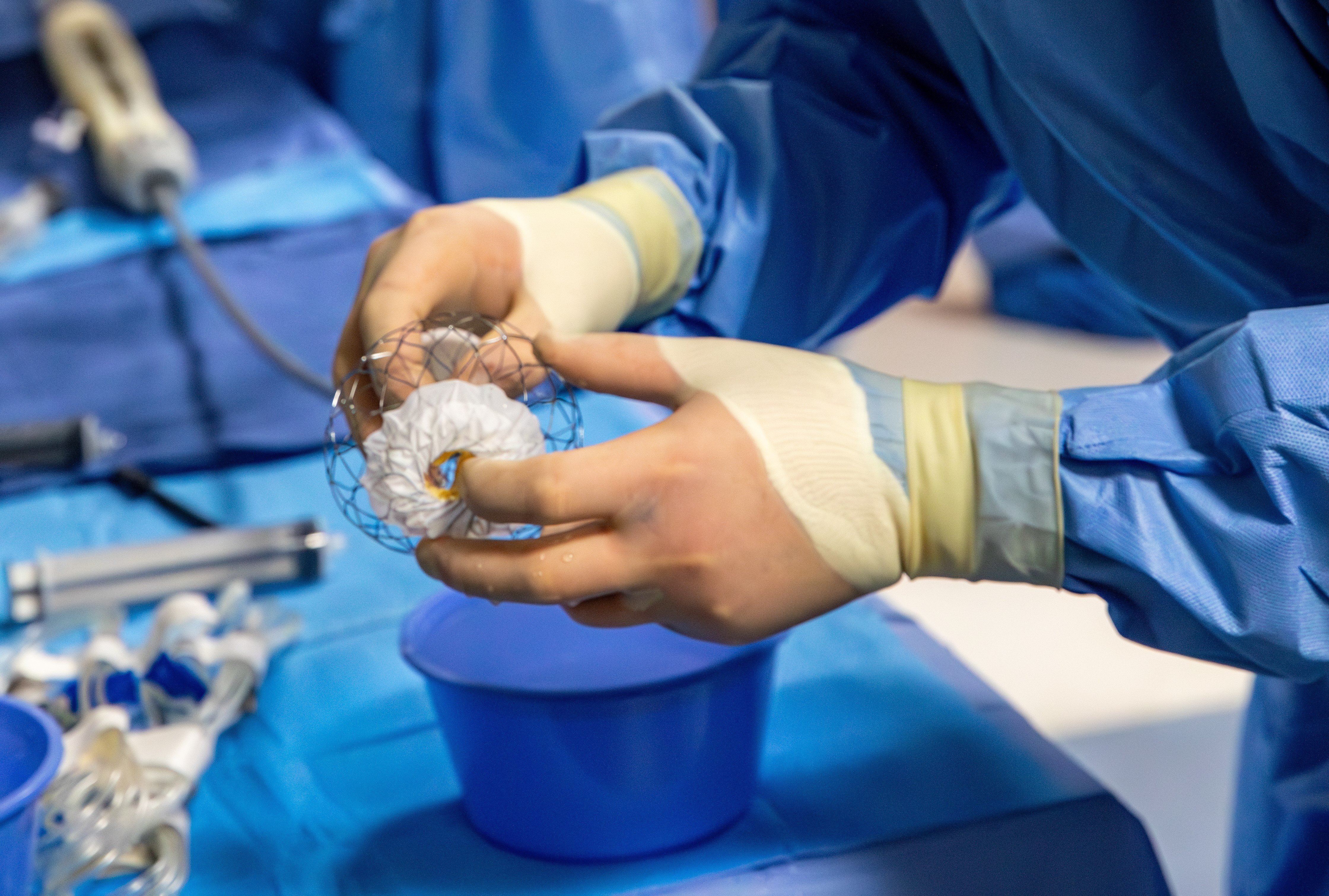Tampa General Hospital Is the First and Only in the Southeast to Complete Transcatheter Mitral Valve Replacement (TMVR) with AltaValve Technology
Published: Jan 30, 2024
Tampa General is one of just five health care institutions in the nation to offer AltaValve as an alternative to open-heart surgery.
Tampa, FL (Jan. 30, 2024) – Tampa General Hospital (TGH) celebrated excellent results from its first transcatheter mitral valve implant (TMVR), making it the first and only hospital in the Southeast to complete a mitral valve replacement procedure via a catheter. The patient suffered from severe mitral regurgitation (MR), a common heart disease that generally requires open heart surgery. The patient underwent the minimally invasive procedure in December at Tampa General’s main campus on Davis Islands in downtown Tampa and was safely discharged after just two days.
“At Tampa General, we’re pioneering new technologies that can save lives, especially for the patients with the highest risk,” said John Couris, president and CEO of Tampa General Hospital. “The transcatheter mitral valve replacement was made possible by a multidisciplinary team of best-in-class professionals who don’t just meet standards of care; they establish them. With new technologies, groundbreaking innovations and unparalleled talent, the team at Tampa General is working to transform health care.”
Tampa General Hospital is one of just five health care systems across the nation approved by the Food and Drug Administration (FDA) to participate in a feasibility study using the AltaValve technology for TMVR. As an academic health system, Tampa General and USF Health combine clinical care, academics and research to deliver the best possible patient outcomes. This robust research enterprise enables providers to use cutting-edge technologies, resources and therapies to address some of the most complex health conditions.
“The successful outcome of this innovative procedure is a great example of the way patients benefit from the expertise of faculty physicians in academic health systems,” said Dr. Charles J. Lockwood, MHCM, executive vice president of USF Health and dean of the USF Health Morsani College of Medicine. “Academic health systems are able to provide multidisciplinary, life-saving and cutting-edge care in the most complex cases – often with procedures and techniques that patients simply can’t get elsewhere. It’s because we can provide this level of care that patients have better outcomes and are more likely to survive when they receive treatment at an academic medical center.”
Lockwood also is executive vice president and chief academic officer at Tampa General.
The multidisciplinary team that contributed to the success of the procedure is comprised of interventional cardiology, cardiothoracic surgery, cardiac imaging and heart failure specialists. This multidisciplinary team allows for an unbiased approach, with the consideration of all options for each patient, ranging from conventional open chest surgery, minimally invasive surgery and transcatheter therapies.
“It’s exciting to have a new, alternative, minimally invasive procedure to treat mitral valve disease with such exceptional results and fast recovery. Patients across the Southeast can turn to Tampa General for solutions to complex and high-risk cases,” said Dr. Hiram Bezerra, director of the Interventional Cardiology Center of Excellence at TGH and professor in the Division of Cardiovascular Sciences at the USF Health Morsani College of Medicine. “This patient is well on the road to recovery thanks to a talented team of doctors, surgeons, nurses and researchers who are pioneers of the health care industry.”
The success of the procedure is the first step toward full FDA approval of the AltaValve device, according to Dr. Lucian Lozonschi, who serves as co-director of the Minimally Invasive Valve Program at TGH with Bezerra.
“Unlike transcatheter aortic valve replacement (TAVR), which is now the standard of care and has mainly displaced conventional open-chest surgery, the TMVR field remains challenging, as evidenced by the absence of an FDA-approved TMVR valve despite years of dedicated research,” said Lozonschi, director of Cardiothoracic Surgery Center of Excellence at TGH and a professor in the Department of Surgery in the USF Health Morsani College of Medicine. “AltaValve is a new player in this field, extending hope to those with heavily diseased mitral valves and at high risk for the conventional surgical approach.”
The AltaValve is a prosthetic valve created by a 3D printer that is implanted in the left atrium during a minimally invasive procedure. Its unique design is customized to the patient’s physical measurements and ensures critical cardiac structures are retained within the left ventricle. It is a self-expanding device that is fully functional seconds after deployment, ensuring the patient’s hemodynamic stability.
“For patients who have exhausted medical therapy and found traditional transcatheter or surgical options inadequate, the AltaValve offers a new ray of hope,” said Dr. Konstantinos Marmagkiolis, a member of the TGH Interventional Cardiology Center who served as co-principal investigator of the AltaValve study.
In preliminary clinical trials of the AltaValve, patients experienced significant improvement in heart function and a reduction in symptoms of mitral valve regurgitation.
